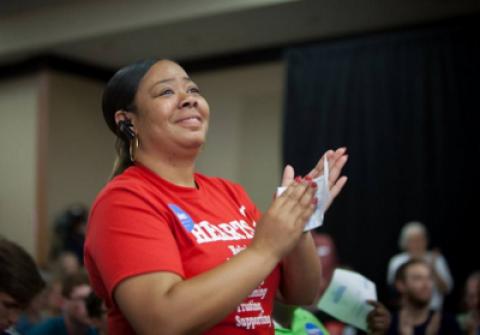Meet the Group of African-American Organizers Building Black Support for Bernie Sanders
[Reprinted with permission from In These Times. All rights reserved.]
As his campaign understands, unless he can ignite the so-called Obama coalition that includes youth, people of color and single women, his likelihood of victory goes from remote to infinitesimal.
Will Crosby, 63, a veteran political organizer in Chicago's bruising electoral battles, is worried that the black community will be caught flat-footed in the 2016 presidential campaign.
The way he sees things, too much of the black electorate is sleepwalking in lockstep support of Hillary Clinton. She is by far the black electorate's favored candidate, with an 80 percent approval rate.
But Crosby thinks Bernie Sanders is the best presidential candidate for African Americans. "Bernie Sanders is talking about issues that directly affect our community and he's doing it in a fearless way," Crosby says. Unfortunately, he adds, Sanders' message has yet to penetrate into the black community.
Crosby and other Chicago-based black activists have formed a group called the Bernie Brigade that attempts to showcase Sanders' progressive platform and long history of support for the black struggle. The group canvasses for Sanders in majority-black neighborhoods and holds pro-Sanders events. "We're still very much engaged in an educational process," he notes. "Many in our community are unfamiliar with Bernie. They just see an elderly white man from remote, white Vermont. And, quite frankly, that's a hard sell."
Crosby says attitudes are easily changed when they hear Sanders' political spiel and his policy prescriptions, especially on reforming the criminal justice system and curbing wealth inequality. But a black electorate that feels warmly toward Clinton may not take the time to listen. According to a CNN poll from June, Sanders had the support of just 2 percent of black Democrats.
The Bernie Brigade is struggling to get political traction in a city still raw from recent hard-fought battles for both Illinois governor and Chicago mayor. The group includes many members who were bitter antagonists in those elections. "If Bernie can bring us together for one cause, I know he can grow his appeal to the larger black community," Crosby says.
That's essential for Sanders. As his campaign understands, unless he can ignite the so-called Obama coalition that includes youth, people of color and single women, his likelihood of victory goes from remote to infinitesimal.
In 2012, the percentage of black voter turnout surpassed white voter turnout for the first time in history and, in large part, accounted for Obama's re-election. But without Obama as a candidate, generating that kind of electoral enthusiasm seems unlikely.
Sanders faces a problem that often confronts progressive mavericks who strike a chord with an enthusiastic sliver of the Democratic electorate, but who routinely fail to ring a bell with voters of color-Paul Tsongas, Gary Hart, Jerry Brown, Eugene McCarthy. These candidates have often been blinded by cultural assumptions that devalue the sensibilities of the black community. Adding to this traditional distance is Sanders' decidedly old-school brand of socialist politics, which is devoted to the materialist notion that economics primarily shape the sociopolitical agenda. In that formulation, race is superstructural-a mere appendage to the means of production.
But in 21st-century America, race is fundamental. Sanders was rudely informed of this when Black Lives Matter activists interrupted his speeches during two campaign stops. These disruptions have forced Sanders to readjust his policy platform and stump speeches, which now include diatribes against institutional racism and the criminalization of the black community.
If Sanders stands a chance, black voters will have to be convinced, again, that Clinton is not the best candidate. A black man convinced them last time; can an elderly white man do it this time?
Some are already convinced. "Bernie Sanders' goals for the country line up with mine better than those of any other candidate in the race," says Stella Hetherington, a Chicago resident who organized one of the many "African-Americans for Bernie Sanders" Facebook groups. "Even if he didn't directly address black issues, the issues he does address will still have a positive effect on our lives."
[Salim Muwakkil is a senior editor of In These Times, where he has worked since 1983. He is the host of "The Salim Muwakkil" show on WVON, Chicago's historic black radio station, and he wrote the text for the book HAROLD: Photographs from the Harold Washington Years.]
Portside is proud to feature content from In These Times, a publication dedicated to covering progressive politics, labor and activism. To get more news and provocative analysis from In These Times, sign up for a free weekly e-newsletter or subscribe to the magazine at a special low rate.


Spread the word